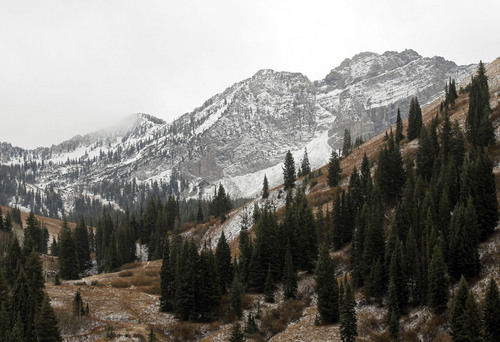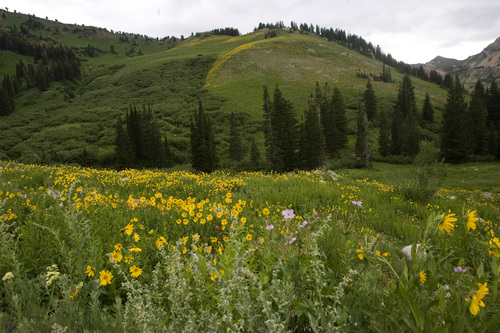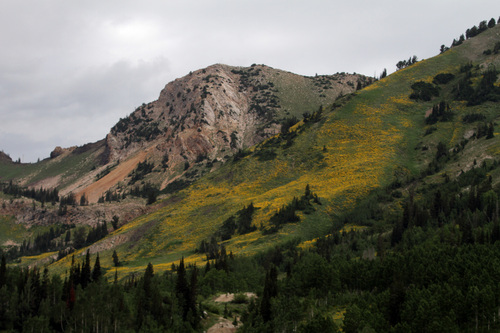This is an archived article that was published on sltrib.com in 2014, and information in the article may be outdated. It is provided only for personal research purposes and may not be reprinted.
A decision by the state engineer to transfer downstream water rights to would-be developers in Little Cottonwood Canyon is enabling a water grab that could hurt municipal users and promote residential development in one of Utah's most popular mountain recreation spots.
That's according to two lawsuits filed Friday seeking to invalidate two orders issued last month by State Engineer Kent Jones.
In separate suits, Salt Lake City and Friends of Alta, a land trust, say applications to transfer water rights to two parcels in Albion Basin, owned by Kevin Tolton and Judith Maack, failed to meet basic requirements because they interfere with existing water users.
At stake is a precedent that could pave the way for homes to rise in the canyon's scenic head — under Devil's Castle and Catherine's Pass — that harbors the upper half of Alta Ski Area.
Jones says his office is not a tool for land-use policy but rather is obligated to comply with state statutes geared toward ensuring public waters are available for "beneficial use."
"If you are entitled to use of the water, you have the right to change the point of diversion, and the place and nature of use of that water," he said Monday. "We give people the benefit of the doubt to pursue an interest in a water right."
Salt Lake City contends Jones is awarding Tolton, who has long fought with the Town of Alta over developing his family's Albion lots, year-round use of summer-only water rights historically associated with irrigation.
The Friends of Alta suit raises similar arguments and asserts Jones failed to determine the transfer's effect on "public recreation or the natural stream environment, or [whether it would] prove detrimental to the public welfare," as required by state law.
That suit, filed by Salt Lake City attorney Pat Shea, also alleges "significant political figures" associated with Gov. Gary Herbert's office applied improper pressure on Jones and his boss, Mike Styler, executive director of the Department of Natural Resources.
But Jones said he was just following Utah law, which obligates the state engineer to approve change applications if "there is unappropriated water in the proposed source, the proposed use will not impair existing rights or interfere with the more beneficial use of the water."
Tolton and Maack met these requirements, according to his Jan. 9 orders, as long as they do not divert water from a surface source. Each parcel may take 0.373 acre-feet per year from wells drilled into bedrock, and all waste water must be stored in a vault and trucked out of the canyon.
"If they take water from bedrock," Jones said, "the impairment [to existing water users] is minimized."
Four similar change applications are pending in Jones' office, all hoping to apply water that's been historically controlled by the South Despain Ditch at the mouth of the canyon to parcels in Albion Basin.
The basin holds about 80 platted lots in three subdivisions established decades ago. Just 21 have been built, the last one in 1981, and about half of the remaining have been bought for conservation purposes to ensure they are never developed.
But 30 or more remain in private hands, including one owned by the family of retired NFL Hall-of-Famer Steve Young. Friends of Alta has a standing offer to purchase title to any of the Albion lots.
The Friends' executive director, Jennifer Clancy, called Jones' decisions "unprecedented."
"It becomes a welcome mat for development in Salt Lake City's delicate watershed," she said. "The effects of any such transfer would interfere in an extremely damaging way with the watershed Salt Lake depends on. It must be challenged in court."
Environmentalists and others worry that transferring water rights to these lots would mean less water for in-stream flows and downstream water users, such as the five Salt Lake County cities that depend on Little Cottonwood Canyon for a big share of their culinary water.
A message left with Tolton's lawyer was not returned.
Other entities protesting the water-rights transfers include Alta Ski Lifts Co., which operates the ski area, Metropolitan Water District of Salt Lake and Sandy, Town of Alta, Sandy, and the U.S. Forest Service, which manages most of the land in Little Cottonwood Canyon.
Salt Lake City's suit alleges Jones had dismissed these protests on the shaky grounds that their motives were "impure." Jones' orders do suggest that the protesters' goal is to thwart residential development.
"If the protestants believe as a matter of public policy it would be best to restrict further development in Little Cottonwood Canyon," Jones wrote, "they should work through other appropriate means to achieve that goal."







